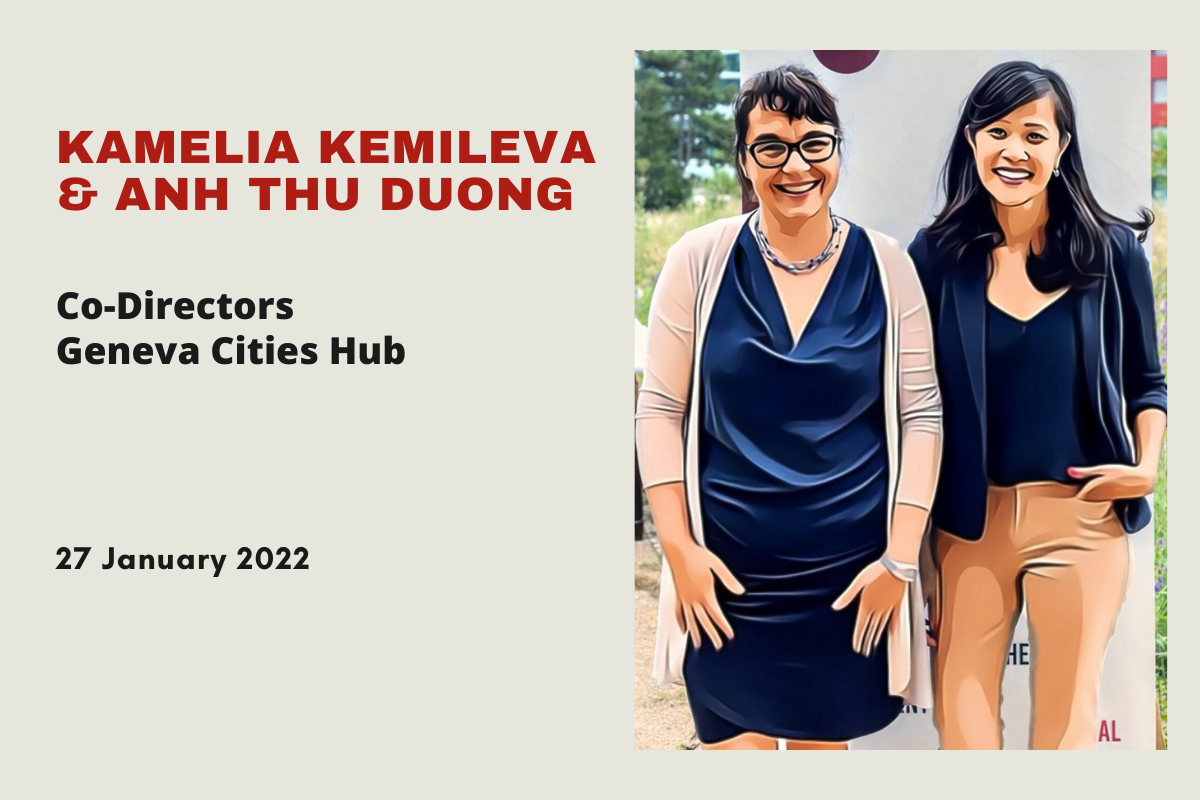The Interview | Kamelia Kemileva & Anh Thu Duong
 |
Could you tell us briefly what your organization does? What is your role? What is your goal? |
The Geneva Cities Hub was created in 2020 by the City of Geneva, the Canton of Geneva, and the Swiss Confederation. The goal of our platform is to strengthen links between cities, their networks, and International Geneva. To this end, we support the participation of cities in Geneva-based multilateral bodies and processes addressing major global challenges, such as health, human rights, resilience in the face of natural disasters, and so on.
For example, we launched a discussion about how to encourage cities, as well as local and regional authorities, to participate in the Universal Periodic Review (UPR). The UPR is an intergovernmental process that involves the review of the human rights record of all countries in the world. While civil society is actively involved in this process, local authorities have, so far, been left out, despite their important role in the implementation of human rights at local level. The Geneva Cities Hub is working with several partners to develop concrete ways and means to get cities more involved in this State-led process.
 |
Among the concentration of actors in Geneva (OIs, NGOs, permanent missions, academia, and the private sector), who do you work with and how? |
The Geneva Cities Hub works with the full range of organizations that constitute International Geneva. That includes the United Nations and its various agencies, other international organizations, diplomatic missions, non-governmental organizations, and academia. The GCH encourages these organizations to collaborate more closely with cities and their networks, given that there is always an urban dimension to their work (see Geneva Cities Hub’s “mapping” of organizations addressing urban issues). Many organizations have an "urban focal point," who is our primary contact. We work with them to identify relevant entry points for cities and their networks to engage in State-led processes. It is about giving cities a voice and creating more awareness of the solutions developed locally to address global challenges, such as climate change, pandemic resilience, mass migration, and so on.
 |
What are the strengths and weaknesses of Geneva with regards to the development of your activity? |
Cities and their networks have not had a presence in International Geneva until very recently. It is Geneva's main weakness in terms of what the Geneva Cities Hub is trying to accomplish. But that's also why the organization was created! There is still a lot to be done to ensure that cities become full participants in Geneva-based global governance. Geneva's strength is that it is the United Nations' main operational hub. As such, it is home to an unparalleled number of international entities, which makes it particularly relevant for cities that want to engage on the international scene.
 |
What do you think global governance should look like 20 or 30 years from now? |
To remain relevant and respond to global challenges both collectively and effectively, global governance must include all players who can deliver solutions. States play a leading role and will continue to do so. However, the scale of challenges has become so large that States can no longer respond to them on their own. Civil society is now fully participating to global governance mechanisms and contributes to shaping solutions alongside national governments. Similarly, the private sector has also taken on a growing role.
Cities need to follow a similar path and become major players at the international level. On the one hand, they are highly impacted by global challenges, and on the other, they play a crucial role in designing solutions to them. For example, it is impossible to fight climate change without involving cities, as they generate more than 70% of greenhouse gas emissions. Cities are key players and many of them around the world have already taken innovative measures at the municipal level to reduce emissions. Local solutions are crucial to solving global challenges!
Tomorrow’s global governance needs to reflect this situation. It is not easy to imagine what the future global governance mechanisms will look like. But we could start by strengthening processes that give cities a voice. The United Nations Economic Commission for Europe recently created the Forum of Mayors, which enables city leaders to exchange good practices on sustainable urban development. While its scope is currently regional, the forum should broaden its scope and serve as a place where cities, States and other stakeholders can regularly meet to discuss global challenges.
 |
What question would you like to have been asked? |
We would have liked to be asked: what is the main political obstacle to enhancing the participation of cities in multilateralism?
This is a politically delicate question, to the extent that it involves introducing new players into a game whose rules have been decided by States, for States. After all, cities are part of States, which are typically eager to assert their sovereignty within their territory. Also, enhancing the involvement of cities in multilateral processes raises numerous political, legal and logistical issues. Nevertheless, the Geneva Cities Hub is convinced that cities can add value at the international level. It is not about setting cities in competition with States, but rather presenting complementary viewpoints and local perspectives that can help elaborate practical solutions to global challenges. To this end, we need to develop, strengthen, and create new mechanisms to bring States, cities, and other international players together regularly to discuss specific issues. That is the mission of the Geneva Cities Hub.
